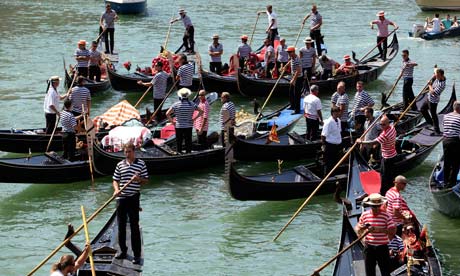
Gondoliers pay their respects near the scene of the German tourist's death in Venice. Photograph: Manuel Silvestri/Reuters
The death in Venice this month of a tourist in a gondola that was crushed by a waterbus has prompted the city's mayor to crack down on the chaotic congestion in the Grand Canal.
Joachim Vogel, 50, a German professor of criminal law, was taking a tour with his wife and three children on 17 August when the gondola they were in was crushed against a dock by a reversing vaporetto.
In a city free of cars, the buildup of waterbuses, delivery boats and watertaxis – owing to the steady rise of tourist numbers – means officials are now being forced to treat Venice's canals like any busy street, with plans for bans on mobile phone use while steering and stricter rules on turning and overtaking.
"I am amazed this crash didn't happen sooner. People do exactly what they like on the canals," said Aldo Rosso, a former city-appointed representative of Venice's gondoliers.
Among the 26 congestion-busting measures announced this week by Venice's mayor, Giorgio Orsoni, are drug and alcohol tests for boat handlers, following reports that the gondolier involved in the fatal collision had traces of cocaine and marijuana in his blood.
The gondolier, Stefano Pizzaggia, is under investigation by magistrates along with the pilot of the waterbus and other pilots who were close to the incident.
"The gondola was allowed to be where it was when it was hit, so it does not look like the gondolier's behaviour had anything to do with it," said Nicola Falconi, the current representative of the gondoliers, who have been working the canals of Venice in their handbuilt black vessels for 1,000 years.
"A small minority of young gondoliers may use drugs but older gondoliers are more than happy at the prospect of drug testing," he added.
Ugo Bergamo, the city council's assessor for transport, said: "There might be a few rotten apples, but Venice's gondoliers represent the city well."
Gundula Vogel, the widow of the crash victim, appeared to lay the blame on the waterbus pilot. "It was an absurd situation – we continued to shout from the gondola, but the vaporetto hit us and then pulled out without being aware of what had happened," she said on Saturday. "I cannot understand how they can undertake such manoeuvres without a sailor in the stern, a camera or mirrors that allow them to see what is happening to their rear."
Since the crash, gondoliers have reported two near misses on the Grand Canal. "I feared for my life and those of my customers," said Alessandro Secco, after one close shave with a waterbus.
A Venetian entrepreneur who declined to be named said: "Gondoliers are victims but they do also take advantage of the precedence they have on the water and the vaporetti pilots accuse them of getting in the way. There is an ugly confrontational atmosphere since the crash."
Falconi admitted there was tension but said gondoliers were due to meet pilots to thrash out their differences and "avoid a manhunt". Among the mayor's 26 measures, which will be debated with canal users before going into effect, are bow propellers on vaporetti to allow them to manoeuvre more easily, a ban on gondolas on the Grand Canal before mid-morning to allow goods boats to complete deliveries, the removal of some landing jetties and a ban on gondolas navigating in groups during the day.
Gondolas offering rides from one side of the Grand Canal to the other – a cheap alternative to a gondola tour – may be cut back.
"I like the plan to install police officers at points along the canal with whistles and signs," said Falconi.
Bergamo said the problem on the Grand Canal was not the level of traffic. "That has not increased since 2006," he said. "The problem is people going too fast. Last year, the handing out of fines for going over 6km/h was halted after a judge ruled the use of speed cameras was an invasion of privacy."
But Matteo Secchi, spokesman for the local activists' group Venessia, disagreed. "There was already too much traffic in 2006," he said. "It all comes back to how Venice cannot support the tourists who come here, it is a simple question of space. The difference is that changes get made when people die," he said.